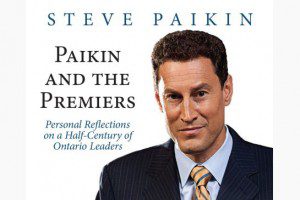 A few weeks ago, as I showered, shaved and made my way to work, CBC Radio’s local Toronto morning show invited audience comment. Host Matt Galloway wondered: “Where do Torontonians go, to find absolute silence?”
A few weeks ago, as I showered, shaved and made my way to work, CBC Radio’s local Toronto morning show invited audience comment. Host Matt Galloway wondered: “Where do Torontonians go, to find absolute silence?”
In a matter of a few seconds, I had an answer and texted it to him: “Sealed inside the rare books section at the Robarts Library, right down to the white gloves so your hands don’t rustle pages.”
I hadn’t thought about Ontario’s 17th premier in a long time. But when Galloway posed the question, I quickly remembered research I had conducted back in the early 1970s. I needed to find excerpts from particularly rare books and the only source was the then brand new John P. Robarts Research Library at the University of Toronto. By coincidence, this past week, I’ve been reading my colleague Steve Paikin’s new book, “Paikin and the Premiers.” Among other things, Paikin reminded me that Premier Robarts gave this province much more than a quiet research library.
“He steered the provincial ship during what may have been its most prosperous decade ever,” Paikin wrote.
And as the TVO host went on to point out, Robarts also introduced Ontario to the atomic age of energy, with the construction of the province’s first nuclear generating station at Pickering. Under his watch, the province built Ontario Place with its space-age dome on the lakeshore. And he shepherded in the province’s community college network (supervised by the man who would succeed Robarts, William Davis).
Remarkably, Steve Paikin, as a fellow politics-watcher correctly noted, has gained “half a century of insider knowledge” about how Ontario’s premiers managed to govern the way they did. Indeed, during the course of his journalism career, Paikin has interviewed, written about and/or studied at close range the past eight premiers since Robarts, and has assembled those data from his “privileged perch” reporting for CBC Television and then hosting a variety of politically focused programs at TV Ontario since the early 1990s. Nobody’s been closer to the premiers (besides their families) than Paikin. And his sense of their shortcomings and flaws is as perceptive as his documenting of their strengths and legacies.
Of Ontario’s shortest lived premiership, that of Frank Miller in 1985, Paikin captured a number of poignant moments. Most notably, he talked to the man from Muskoka, about presiding over the end of the Conservatives’ 42 years in power in Ontario. He also got Miller to admit that he’d once tried to sell off TVO, but that Bill Davis had prevented the move.
“In hindsight,” Miller told Paikin, “I’m glad we didn’t. Up here in Bala, we don’t have cable and TVO is pretty much the only channel we get.”
Speaking of candor – something Paikin often sparks in his interviewees – in a retrospective interview with the 20th premier of Ontario, Paikin asked David Peterson to explain how his Liberal government, (following Premier Miller), had changed the province. He trumpeted the Liberals’ introduction of the Blue Box, TV in the Ontario Legislature and minority rights, in particular, the use of French in official matters. But it was Peterson’s assessment of his predecessors that gave pause.
“The Tories gave us pretty good government, you know,” Peterson admitted. “And they were pretty practical and good people… Bill Davis is a good man. John Robarts is a good man.”
Journalist Paikin explores with equal depth and thoughtful analysis the careers of Conservative premiers Mike Harris and Ernie Eves as well as the most recent Liberal premier to step down, Dalton McGuinty. But I give the remainder of my column to an extraordinarily honest moment in Steve Paikin’s recollections of his on-air meetings with the premiers. It was Sept. 6, 1990, the night the New Democratic Party won its first provincial election in Ontario, and the night when NDP leader Bob Rae surprised even himself by becoming premier. Paikin was anchoring coverage for CBC TV.
“It’s an NDP majority government,” Paikin announced to his audience. “It’s the story of the century!” And even Steve recognizes he’d gone a bit over the top.
But it was Paikin’s subsequent first interview with the new premier that caught most of us off guard. Steve is never one to pull punches. And yet he has always taken great pride in delivering memorable responses from his political guests. In his book, Paikin suggested Bob Rae knew Steve wanted the interview to end with something personal, emotional and memorable.
“Mr. Rae,” Paikin said, “you have had your share of tragedy recently. Your brother David died of leukemia last year… Your in-laws were killed by a drunk driver… Do you see tonight’s victory as somehow payback for all that tragedy?”
“Well,” Bob Rae said after deciding to rise to the challenge of the question, “I was just saying to my mother this morning that I thought the Rae family was due for a party.”
To me, both Paikin’s question and the premier’s answer speak volumes about what journalism and politics ought to be and can be in Ontario.